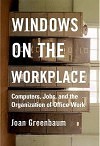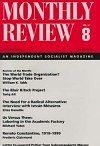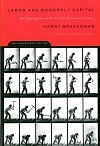Movements
History, as if to warn us continuously against any tendency toward complacency, is full of ironies. As recently as a few months ago, the close of the twentieth century had come to be associated, in the prevailing view of the vested interests, with “endism”: the end of class struggle, the end of revolution, the end of imperialism, the end of dissent—even the end of history. The new century and new millennium were supposed to symbolize that all of this had been left behind and that we could look forward to a new era of infinite progress based on the New Economy of the information age, which would usher in a gentler, kinder, virtual capitalism. The main worry was a technical glitch known as Y2K. Would computers across the world malfunction on January 1, 2000? | more…
Will This Include the US Labor Movement?
Capitalism is a system of production and distribution driven by the ceaseless efforts by capitalists to accumulate capital, that is, to maximize both profits and the growth of capital. Accumulation, in turn, is made possible by the exploitation of wage laborers, persons without any direct access to society’s productive property. Workers are forced to sell their ability to work but when they do, they are owed nothing by their employers except a wage. That is, the employers have no social obligation to the workers; their relationship to them is impersonal in the extreme. It follows that, in the abstract, employers do not care anything about the workers’ “characteristics.” To them, black workers are interchangeable with whites, men with women, one nation’s workers with those of any other. Employers are, in a word, equal-opportunity exploiters. They will replace one worker with another, move their capital to take advantage of cheaper labor (whatever its characteristics), and pit one group of employees against another, whenever such actions will, in their view, make it easier for them to accumulate capital | more…

In this eye-opening book, Joan Greenbaum tells the story of changes in management policies, work organization, and the design of office information systems from the 1950s to the present. Windows on the Workplace takes us behind the news stories of the highly efficient, high-tech workplace and shows us the ways in which technologies—computers, mobile phones, the internet—have been adapted by management to reshape the way work is done. In tracing the introduction of new technologies, Greenbaum reveals how organizations use them to benefit from both increased profits and more intense control over the workforce. | more…
It is an old axiom, common to both Marxian and Keynesian economics, that uneven, class-based distribution of income is a determining factor of consumption and investment. How much is spent for consumption goods depends on the income of the working class. Workers necessarily spend almost all of their income on consumption, with relatively little left over for savings or investment. Capitalists, on the other hand, spend only a small percent- age of their income for personal consumption. The overwhelming proportion of the income of capitalists and their corporations is devoted to investment | more…
Understanding the Politics of Globalization
The “Seattle Shock”-as Business Week called it in an editorial that warned of a popular backlash against “our very economic system”-reflects heartfelt indignation by the financial press at the intrusion of mass democracy into an elite discourse. In the New York Times, columnist Thomas Friedman raged at anti-World Trade Organization (WTO) protesters, whom he presents as “flat-earth advocates” duped by knaves like Pat Buchanan. Friedman, perhaps the most obtuse of the big-time columnists, complains that “What’s crazy is that the protesters want the W.T.O. to become precisely what they accuse it of already being-a global government | more…

Our Assistant Editor, Vicki Larson, was in Seattle for the demonstrations against the WTO. We are pleased, indeed proud, to present Vicki’s account of these very important events | more…
When the Berlin Wall came down in 1989, it was not simply the Soviet Union or the “communist idea” or the efficacy of Marxist solutions that collapsed. Western European social democracy, too, was severely dented. In the face of a triumphalist capitalist storm that swept the world it, too, had to trim its sails. The fact that, barring Spain, social democratic parties or coalitions govern most of Western Europe today is of inter- est largely because of the collective experience it provides: these parties can no longer deliver effective policies that improve the conditions of the majority of electors whose votes have placed them in power. Capitalism, unchallenged from any quarter, no longer feels the need to protect its left flank by conceding reforms | more…
Interview with István Mészáros
From the modern vision, the great revolutions, the anti-Nazi war, to the collapse of socialism in East Europe and to the sovereignty of the market, what do you think about the twentieth century—the “century of extremes” as Hobsbawm calls it? | more…
Laboring in the Academic Factory
Consider the following items culled from some of the journals, newspapers, and email discussion groups to which I subscribe: | more…
In 1975, Leonard Peltier was convicted of the murder of two government agents after a violent confrontation on the Oglala reservation that pitted the American Indian Movement (AIM) and local Sioux against law enforcement officers. Two other AIM members were acquitted in a separate trial, but Peltier received two consecutive life sentences. The trial is the subject of the documentary film
Incident at Oglala (1975). February 6, 2000, marks Peltier’s twenty-fourth year in prison. Information about his case can be found at
www.lpsg-co.org, or by contacting the Leonard Peltier Defense Committee, PO Box 583, Lawrence, KS 66044, USA. The following letter was first published on the Internet by the
National Commission for Democracy in Mexico (NCDM), based in Austin, TX

This widely acclaimed work, first published in 1974, overturned the reigning ideologies of academic sociology and became the standard text for many basic areas of sociological inquiry, including the science of managerial control, the relationship of technological innovation to social class, and the eradication of skill from work under capitalism. | more…
Paul Buhle, Taking Care of Business: Samuel Gompers, George Meany, Lane Kirkland, and the Tragedy of American Labor (New York: Monthly Review Press, 1999), $18, 315 pp.; Mike Parker & Martha Gruelle, Democracy is Power: Rebuilding Unions from the Bottom Up (Detroit: Labor Notes, 1999), $17, 255 pp.
In a very well-known passage, Marx said, “Men make their own history, but they do not make it just as they please; they do not make it under circumstances chosen by themselves, but under circumstances directly encountered, given and transmitted from the past.” Elsewhere, he said, “The tradition of all the dead generations weighs like a nightmare on the brain of the living.” These words of wisdom provide us with a good entry point into a review of these two exceptional books | more…


